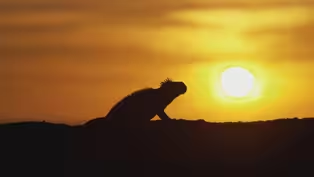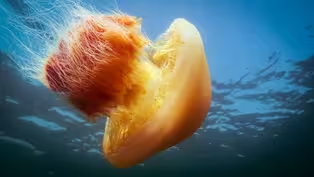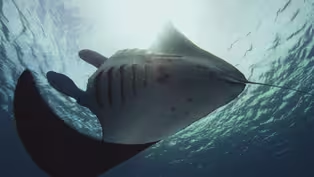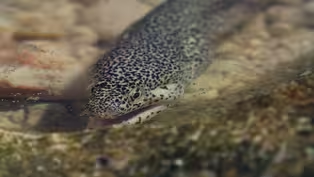
Marine Iguanas
Clip: Episode 3 | 3m 27sVideo has Closed Captions
The marine iguana is the only one of its kind with adaptations to thrive in the ocean.
On the Galapagos Islands, marine iguanas have developed new behaviors to make the most of the rich meadows of algae offshore. They can hold their breath up to an hour while feeding on the algae. After the excursion, a gland in the marine iguana’s nose filters out excess salt that it unavoidably ingests while foraging in the ocean. Then all the iguana has to do is sneeze.
Problems playing video? | Closed Captioning Feedback
Problems playing video? | Closed Captioning Feedback

Marine Iguanas
Clip: Episode 3 | 3m 27sVideo has Closed Captions
On the Galapagos Islands, marine iguanas have developed new behaviors to make the most of the rich meadows of algae offshore. They can hold their breath up to an hour while feeding on the algae. After the excursion, a gland in the marine iguana’s nose filters out excess salt that it unavoidably ingests while foraging in the ocean. Then all the iguana has to do is sneeze.
Problems playing video? | Closed Captioning Feedback
How to Watch Big Pacific
Big Pacific is available to stream on pbs.org and the free PBS App, available on iPhone, Apple TV, Android TV, Android smartphones, Amazon Fire TV, Amazon Fire Tablet, Roku, Samsung Smart TV, and Vizio.
Buy Now
Providing Support for PBS.org
Learn Moreabout PBS online sponsorshipEpisode 3 Extended Preview | Voracious
Video has Closed Captions
Preview: Ep3 | 1m 14s | The challenge of finding food drives all life in the Pacific. (1m 14s)
Video has Closed Captions
Preview: Ep3 | 30s | The challenge of finding food drives all life in the Pacific. (30s)
Video has Closed Captions
Clip: Ep3 | 2m 47s | Manta rays feed nearly constantly on prey so minute it is just a haze in the water. (2m 47s)
Video has Closed Captions
Clip: Ep3 | 3m 36s | In the Marshall Islands Moray Eels are learning to hunt on land. (3m 36s)
Providing Support for PBS.org
Learn Moreabout PBS online sponsorship
- Science and Nature

Explore scientific discoveries on television's most acclaimed science documentary series.

- Science and Nature

Capturing the splendor of the natural world, from the African plains to the Antarctic ice.












Support for PBS provided by:



